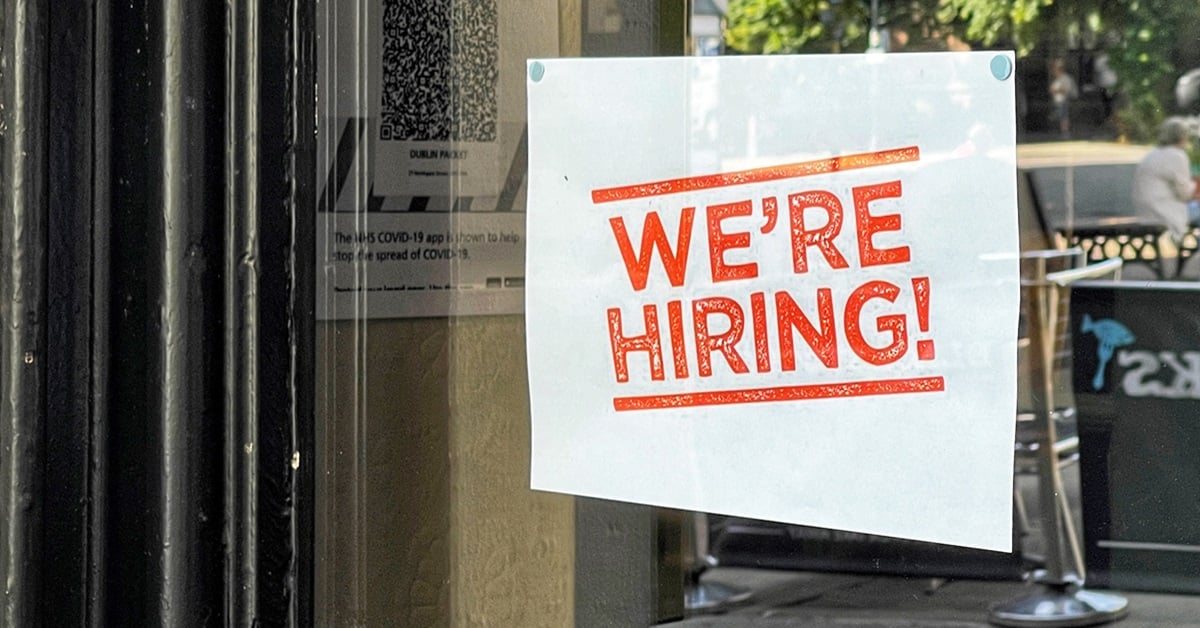In recent years, hospitality venues have been forced to grapple with all kinds of changing conditions, not least of which has been hospitality staff shortages.
In this guide, we will address the causes of this hospitality staff shortage. We will also provide 5 core strategies to help you handle staffing shortages in your venue, now or in the future.
Why have there been hospitality staff shortages in Australia and New Zealand?
Research indicates that hospitality staff shortages are largely due to issues relating to pay, burnout, harassment and unreasonable workplace demands. A recent survey into the working conditions of chefs in Australia and New Zealand had the following findings:
- 67% of chefs work more than 38 hours weekly, with a fifth of chefs working between 52-61 hours.
- A quarter of chefs don't receive their legally required breaks.
- 15-20% of chefs reported economic hardship.
- Two-thirds also reported working when sick.
It's not only chefs working under difficult conditions. A 2022 study into Australian hospitality workers in general had stark findings. 50% of surveyed employees did not receive the breaks to which they were entitled, and 60% had experienced some form of bullying or harassment.
As a result, many hospitality venues suffer problems with staff retention. According to a February 2023 report from Jobs and Skills Australia, 27% of hospitality businesses report retention issues. This compares to just 13% for all businesses.
The impact of COVID-19
The COVID-19 pandemic exacerbated these issues in 2 major ways:
- Many hospitality employees who were not citizens or permanent residents of Australia or New Zealand left these countries during the pandemic.
- Many hospitality businesses closed their doors or offered unstable work during the pandemic. As a result, many staff members left the industry during this period to pursue other career opportunities.
Jobs and Skills Australia reported that 66% of hospitality venues suffered from recruitment difficulties in 2022.
However, the situation in Australia appears to have somewhat improved. Hospitality saw a 76.2% fill rate for job openings in the quarter of December 2023.
In New Zealand, the year leading up to March 2023 saw an 8.9% increase in filled jobs (from 138,157 to 150,639) for accommodation and food services.
From September 2022 to September 2023, there were 659,800 migrant arrivals in Australia, a rate of almost 2,000 a day.
This is likely playing a part in the hospitality staff shortage turnaround that’s been seen in recent months. However, the government has expressed a desire to reduce immigration levels, potentially changing the equation for hospitality businesses.
It remains to be seen whether these figures will mark the permanent end of hospitality staff shortages.
What are the impacts of hospitality staff shortages?
Staff shortages can have severe impacts on businesses. According to Jobs and Skills Australia, employers noted the following impacts of staff shortages:
- 65% of employers found that their existing staff are impacted by working overtime or long hours. This has associated negative effects in the form of stress and tiredness.
- 28% of employers noted a negative impact on productivity, revenue or demand. Simply not having enough staff members can result in inferior customer experiences. This results in lower repeat business and inferior word-of-mouth about businesses.
- Incidentally, 8% of employers noted that shortages had impacted their business' reputation.
These specific issues noted by employers have plenty of knock-on effects, too. Retention issues seen across the hospitality industry are only made worse when staff are required to work longer hours and become more stressed.
The good news is that there are plenty of actionable steps owners and managers can take to reduce staff shortages.
5 ways for restaurants to adapt to hospitality staff shortages
1. Sponsor overseas workers
Restaurant owners can sponsor international workers to come and work in their venues. This can help you fill positions with foreign staff members where local employees aren't available.
Currently in Australia, there is an industry labour agreement that can be used by premium dining restaurants. Premium dining restaurants are defined by a number of factors, including offering a wine list, having revenue of at least $2 million per annum, and not being franchised.
This agreement enables many businesses to sponsor skilled overseas workers for periods of up to 4 years and/or for permanent residence.
Outside of this industry labour agreement, there are other visas you may be able to sponsor overseas workers on. These include Training Visas and Skilled Regional Visas.
When sponsoring overseas workers, you generally can only sponsor workers who work under designated "skilled occupations". In hospitality, this can include venue managers and chefs.
Similar systems are in place in New Zealand. Venues can look to hire skilled workers from overseas through visas like Skilled Migrant Category Resident Visas.
Sponsoring overseas workers can be a great way for businesses to manage skill shortages. You can access an extremely wide pool of talent and hire enthused, committed hospitality professionals.
Before sponsoring an overseas worker, ensure you have a strong legal understanding of your responsibilities as an employer. You'll also need to carefully hire the right people for the job. You can look to overseas recruitment agencies to help you find the best candidates.
2. Use automation
Automation can be a powerful method for restaurants to reduce their reliance on staff. These tools can also offer benefits like faster service and greater consistency.
Some of the top methods of automation for restaurants are:
- Table management systems: Use a table management system like ResDiary to dispose of your paper diary and handle your bookings in an automated manner. These systems can also be integrated with your EPOS software and CRM, while ResDiary has a unique automated phone reservation service called ResPhone.
- Digital kiosks: Often seen in quick-service restaurants (QSRs), digital kiosks are an excellent way to streamline the payment and ordering process.
- Robot waiters: What if you could totally replace a front-of-house staff member with a robot? While still an emerging technology, many restaurants are already seeing the benefits of robot waiters. If you're having trouble finding human staff, it might be the perfect time to jump into an automated future.
- Robot chefs: Another emerging technology in hospitality is robot chefs. These machines are currently used to replace some of the most repetitive tasks chefs are faced with.
- AI tools: Get creative and see how AI can help out in your restaurant. For instance, you could cut down on your management team with language models like ChatGPT or machine learning for financial analysis.
In addition to mitigating the impacts of staff shortages, these tools can reduce stress for your current staff. This will improve employee morale and make staff retention easier.
For more information on how to make the most of these tools in your venue, check out our complete guide to automation in restaurants.
3. Use efficient rostering
If your business has a limited number of workers, your rosters must be appropriately optimised. Chances are, your rosters could be a lot better. This could mean that your perceived need for staff might not be as dire as you think.
Using a more efficient roster means that you won’t have to ask staff members to stay back and work overtime as often. This has been identified as a major issue for many hospitality workers. Better rosters can therefore lead to a happier workplace.
One way to improve your rosters is by creating a rotating roster. Rotating rosters are not identical on a week-to-week basis.
This enables you to have more flexible shift patterns and provide more varied working conditions for your employees. Your staff won't become accustomed to working the exact same hours each week and will thus be more amenable to picking up shifts.
ResDiary customers can get additional help here, too. With ResDiary's restaurant reservation system, you can use current and historical booking data to identify how busy particular periods are.
This ensures you have enough staff for peak periods, and don't have team members standing around during slow periods.
4. Optimise job ads
During periods of staff shortages, you have to go the extra mile to attract great staff members. An often-overlooked part of hiring staff members is job ads.
A great job ad helps you stand out from the crowd and appeal to talented staff members. Your ad needs to cover the following areas effectively:
- Summary of the job description
- Duties and responsibilities
- Required experience and qualifications
- Working conditions
- Company culture
- Benefits
Ensure all these elements are clearly communicated to the reader. They should know exactly what they are applying for.
Be sure that readers know what your business stands for with a description of your company culture and values. You should also describe all the benefits and upsides of working in your venue in enough detail to entice the reader.
To help you create the perfect job ad, check out our hospitality sample job descriptions and our complete hospitality HR toolkit.
5. Invest in your current team
One of the key reasons for hospitality staff shortages is due to challenging work conditions for staff members. All too often, hospitality employees are not treated properly and are made to feel as if they are expendable. This can range from insufficient pay to bullying and harassment.
Treating your staff properly should be a fundamental priority for any restaurant owner. But it's also worth noting that investing in your team can help avoid the impacts of staff shortages.
Most importantly, ensure your staff are provided all of their legal entitlements. Pay your whole team on time and make sure everyone is taking their required breaks.
To get the best out of your employees and encourage them to stay, you should take a proactive approach to bullying and harassment.
Implement policies and processes to deal with difficult and aggressive customers so your whole team knows that they are supported, respected and prioritised.
You should also go above and beyond to further the personal and professional development of your team. Organise staff events to help your team get to know each other better and foster a sense of family.
If a member of your team has expressed an interest in developing in their role – such as becoming a sommelier – consider paying for them to take the necessary training. This benefits both your team members and your business.
Investing in your team and creating a great work environment will help you retain your current staff as well as attract new staff to your venue. These are critical steps in overcoming staff shortages.
Manage your restaurant better with ResDiary
If you need a hand managing your team and venue, ResDiary is here. We offer a wide array of features to save time and take the stress out of running your business.
This includes a highly streamlined reservation system, easy-to-use integrations, and additional features like queue management with W8List™. Replacing your old paper diary with an up-to-date system is the perfect way to reduce your reliance on staff.
Join the thousands of customers saving time with ResDiary. Here's what Samantha Capol, office manager of The Naked Racer Moto Co, has to say:
"The table management can automatically join two tables of five to put together a table of ten. [In the past] this would have required us to work out how many tables we had, how many were left and make a call in-line with our 150 people limit. ResDiary works really well for us, particularly for functions and events [where we’d] have to work out how to fit everyone in."
Book a demo today and discover how ResDiary can save time and labour for your business. From table management and beyond, you can have a more efficient restaurant that is able to withstand hospitality staff shortages.
Book a demo today and discover how ResDiary can help increase your restaurant delivery sales.
Disclaimer: This guide is general in nature and does not take into account your individual circumstances. Before acting on any information, you should consider whether this is right for your business.




.jpg)